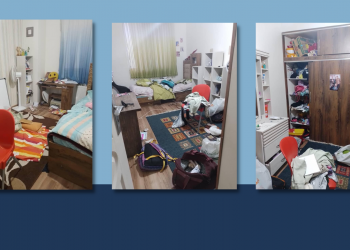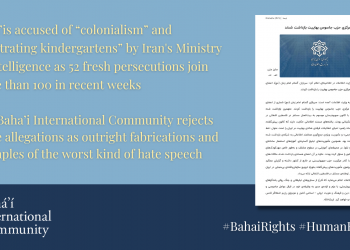Baha’is accused of “colonialism” and “infiltrating kindergartens” as 52 fresh acts of persecution add to more than 100 in recent weeks
Arabic translation here
Iran’s Ministry of Intelligence issued an appalling statement of oppressive hate propaganda against the persecuted Baha’i religious minority yesterday, 31 July, in an attempt to justify the raids on the homes and businesses of 52 Baha’is across Iran and the arrest or imprisonment of 13 individuals.
The Ministry of Intelligence issued a formal statement about the moves—which came after weeks of escalating pressure on the Baha’is—and claimed the arrests were against members of the “Baha’i espionage [political] party” and that those arrested were “propagating the teachings of the fabricated Baha’i colonialism and infiltrating educational environments” including kindergartens. The mention of kindergartens is an apparent pretext for the targeting of a number of Baha’is who are preschool teachers.
The Baha’i International Community rejects these absurd and preposterous allegations as outright fabrications. What the Iranian government is doing is simultaneously an act of gross oppression and a brazen example of the worst kind of hate speech.
Thirteen individuals—among them Mahvash Sabet, Fariba Kamalabadi and Afif Naeimi, formerly part of the community’s leadership and prisoners of conscience who each spent a decade in jail—were arrested during the raids. One is being held in solitary confinement in Evin Prison and the whereabouts of the other two are unknown.
“We are outraged that a significant number of Baha'is, among them Mahvash Sabet, Fariba Kamalabadi and Afif Naeimi, have been detained again in Iran,” said Diane Ala’i, Representative of the Baha’i International Community (BIC) to the United Nations. “And it is even more galling that the Ministry of Intelligence is trying to portray these individuals as agents of foreign powers trying to undermine Iran’s security. The Ministry’s statement is utterly incoherent and self-contradictory and the allegations are clearly absurd and baseless. Iran’s authorities, rather than dealing with the challenges of their country, instead direct their attacks on innocents and try to stoke religious hatred.”
“Iran’s government has for more than 40 years alleged that Baha'is are spies for foreign countries but, in all that time, has failed to produce a shred of credible evidence. Now they are reduced to attacking kindergarten and daycare teachers as a threat to national security,” Ala’i added.
Sabet, Kamalabadi and Naeimi were members of a group of people known as the “Yaran,” or “Friends” of Iran, which until 2008 served as an informal leadership of the Iranian Baha’i community. All seven of its members were arrested in 2007 and 2008 and jailed for a decade. The Yaran tended to the basic pastoral needs of the community—Iran’s largest non-Muslim religious minority—and did so with the knowledge and acceptance at the time of the Iranian authorities. But the Yaran was disbanded as a result of their original arrests and has never been regrouped or reestablished. The implied statements by the Ministry of Intelligence, that they are part of a so-called “core members” of the Baha’i “espionage party,” is therefore absolutely false in every sense.
The raids and detentions come days after 20 Baha’is in Shiraz, Tehran, Yazd and Bojnourd were arrested, jailed or subjected to home searches and business closures, and less than a month since 44 others across Iran were also detained, arraigned or imprisoned. Twenty-six individuals among the 44, who were in Shiraz, were sentenced to a combined total of 85 years in prison.
More than a hundred Baha’is have therefore been targeted in Iran over the past few weeks.
Mahvash Sabet, who wrote poetry during her decade in Tehran’s Evin Prison, which were shared during her incarceration and later published in English under the title “Prison Poems,” was recognized in 2017 as an English PEN International Writer of Courage.
“We are very concerned by reports that Mahvash Sabet, the winner of the 2017 PEN Pinter Prize for an International Writer of Courage, has once again been detained in Iran,” said Daniel Gorman, Director of English PEN. “We will continue to monitor the situation closely.”
Fariba Kamalabadi, a developmental psychologist, was arrested in 2008 and also spent a decade behind bars. In 2017 the United States Commission on Religious Freedom recognized and championed her as a religious prisoner of conscience.
Afif Naeimi, an industrialist who was also arrested in 2008, spent much of his 10-year prison sentence in ill health yet was denied the medical treatment he needed. He was released in 2018 alongside the other members of the former Baha’i leadership group.
“Detaining these Baha’is demonstrates the senseless cruelty of the Iranian government in its systematic campaign to persecute the whole community,” Ala’i said. “Mahvash Sabet, Fariba Kamalabadi and Afif Naeimi are symbols of resilience in Iran, renowned across the world for their courage as prisoners of conscience, and no one will believe the Iranian government’s excuses for attacking a helpless, peaceful community. But this unrelenting and escalating psychological warfare sets the stage for added persecution of the Baha'is in the weeks and months ahead.”



